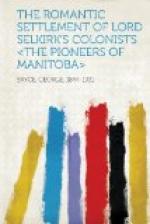On the young birds leaving the parent nest, they only exchanged it for one near at hand—land for the taking; a house to be built, a wife to be got—a share of the stock, some tools and simple furniture, and the outfit was complete. The youngest son remained at home to care for the old father and mother, and to him came the homestead when they were laid away. The conditions were all faithful, home life dear indeed.
To the Hunters accepting their fall in the chase no wilder thought could scarce be broached than that of solicitude as to the future of their young. Boys who sat a horse almost as soon as they could walk, whose earliest plaything was a bow and arrows; girls as apt in other ways, happy; sustained in their environment with a faith truly simple and reverent.
With so large an infusion of Norse blood and certain traditions anent “usquebae” and “barley bree” it would—with so large a liberty—be naturally expected, a liberal proportion of drouthy souls, but with an abundance of what cheers and distinctly inebriates in their midst they were a temperate people in its best sense, with no tippling houses to daily tempt them astray their supplies of spirits were nearly always for festive occasions. “Regales” after a voyage or weddings that lasted for days, and these at times under such guard as may be imagined from the presence of a custodian of the bottle, who exercised with what skill he might his certainly arduous task of determining instantly when hilarity grew into excess.
This novel feature applies, however, almost entirely to the English-speaking part of the people. The Gallic and Indian blood of the Hunters disdained such poor toying with a single cherry and drank and danced and drank and danced again with an abandon, an ardor and full surrender to the hour characteristic alike of the strength of the heads, the lightness of their heels and the contempt of any restraint whatever.
These were, however, but the occasional and generous symposiums of health and vigor that rejects of itself continued indulgence. Our Utopia would be cold and pallid indeed lacking such expression of redundant strength, and joyful vigor.
Certainly the greatest negative blessing that this exceptional people enjoyed, was that they had no politics, no vote. The imagination of the average “party man” sinks to conceive a thing like to this; yet, if an astounding fact to others, no more gracious one can be conceived for them selves. In the unbroken peace in which they lived politics would be but throwing the apple of discord in their midst, an innoculation of disease that they might in the delirium that marked its progress vehemently discuss remedies to allay it.




